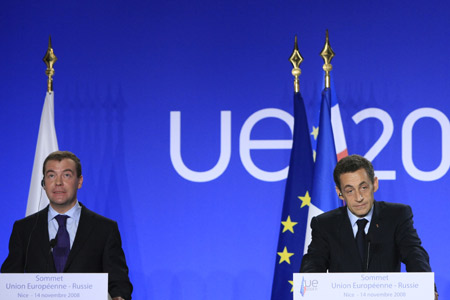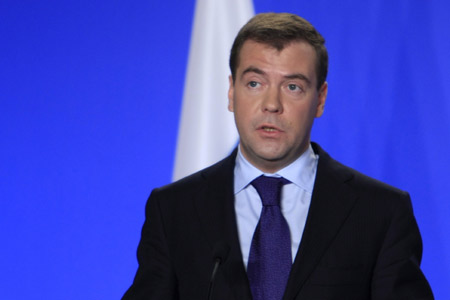Leaders of the European Union (EU) and Russia on Friday concluded their half-day summit with little tangible achievements.
The EU failed to persuade Russia into changing its position on Georgia, a dominant issue at the summit. Russian President Dimitri Medvedev was tough on the issue and refused to back down on Moscow's position to recognize the two breakaway regions of Georgia as independence states.
 |
|
Russian President Dmitry Medvedev (L) and French President Nicolas Sarkozy attend a press conference of the EU-Russian summit in Nice, southern France, Nov. 14, 2008. The EU and Russia held the summit in Nice on Nov. 14. [Xinhua]
|
"The recognition of South Ossetia and Abkhazia is our final decision. It is irrevocable," Medvedev told reporters at the EU-Russia summit.
The EU had said before the summit that the status quo in Georgia is not acceptable and that Georgia's territorial integrity should be restored.
In response, Medvedev said: "Russia fully recognizes the territorial integrity of Georgia, taking into account the recognition as independent subjects of international law of South Ossetia and Abkhazia."
The Russian president rejected EU's demands that Moscow withdraw its troops to pre-conflict positions. "The Medvedev-Sarkozy plan has been fully, appropriately accomplished," said Medvedev, referring to a deal brokered by French President Nicolas Sarkozy, which asks for a withdrawal of Georgian and Russian troops to pre-conflict lines.
 |
|
Russian President Dmitry Medvedev addresses a press conference of the EU-Russian summit in Nice, southern France, Nov. 14, 2008. [Xinhua]
|
Sarkozy said Russia has implemented most of the plan, but more needs to be done, referring to further Russian troops withdrawal from South Ossetia and Abkhazia.
Russia has pulled out its troops from Georgia proper as a result of Sarkozy's mediation. But Moscow retained thousands of troops in South Ossetia and Abkhazia as peacekeepers. Russia had peacekeepers in the two breakaway regions before the Aug. 8 conflict, but at a much smaller number.
Medvedev also rejected the EU's accusation that the Russian use of force in Georgia was disproportionate. He said Moscow's military intervention was "limited, necessary and in accordance with international law."
Georgia launched a sudden attack on South Ossetia on the night of Aug. 7, prompting a rapid military reaction from Russia. Russian troops defeated the Georgian military in five days and took both South Ossetia and Abkhazia as well as swathes of Georgian territory.
The two sides also failed to announce dates for the resumption of negotiations on a framework agreement. The EU had hoped that Russia could agree on the resumption of talks in early December.